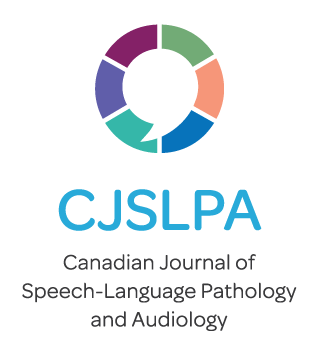

| Author(s) |
Bernard Grela |
| Volume | 27 |
| Number | 4 |
| Year | 2003 |
| Page(s) | 221-228 |
| Language | English |
| Category | |
| Keywords | |
| Abstract |
Abstract One preschool child with specific language impairment (SLI) was compared to a younger, normally developing child for the production of grammatical subjects in sentences with varying levels of linguistic complexity. The children were matched based on mean length of utterance in their spontaneous speech. They were asked to produce sentences within the context of a story completion task that varied in length and number of arguments. The results indicated that both children omitted more subject arguments as complexity increased. However, the child with SLI was more likely to omit subjects in sentences that were less complex. These results are consistent with the theory that grammatical errors in children with SLI and their younger, normal counterparts are due to problems with processing complex linguistic information rather than with limitations in linguistic knowledge. Les phrases produites par un enfant d’âge préscolaire avec un trouble spécifique de développement du langage (TSDL) ont été comparées à celles d’un enfant plus jeune présentant un développement normal au niveau de sa production grammaticale. Cette comparaison a été effectuée en se basant sur la longueur des phrases spontanées de chacun. On leur a demandé de produire des phrases dans une tâche où il s’agissait de compléter des histoires qui variaient en longueur et en nombre d’arguments. Les résultats obtenus indiquaient une augmentation du nombre d’omissions (du sujet dans les phrases) en fonction de la complexité. Cependant, l’enfant présentant un TSDL omettait plus souvent le sujet dans les phrases moins complexes. Ces résultats corroborent la théorie qui stipule que les erreurs grammaticales retrouvées chez les enfants avec un TSDL et leurs homologues plus jeunes, présentant un développement normal du langage, sont plutôt dues au traitement de l’information linguistique complexe qu’aux limites de la connaissance linguistique. |
| Record ID | 842 |
| Link | https://cjslpa.ca/files/2003_JSLPA_Vol_27/No_04_185-232/Grela_JSLPA_2003.pdf |
CJSLPA is an open access journal which means that all articles are available on the Internet to all users immediately upon publication. Users are allowed to read, download, copy, distribute, print, search, or link to the full texts of the articles, or use them for any other lawful purpose.
CJSLPA does not charge authors publication or processing fees.
Copyright of the Canadian Journal of Speech-Language Pathology and Audiology is held by Speech-Language and Audiology Canada (SAC). Appropriate credit must be given (SAC, publication name, article title, volume number, issue number and page number[s]) but not in any way that suggests SAC endorses you or your use of the work. You may not use this work for commercial purposes. You may not alter, transform, or build upon this work.